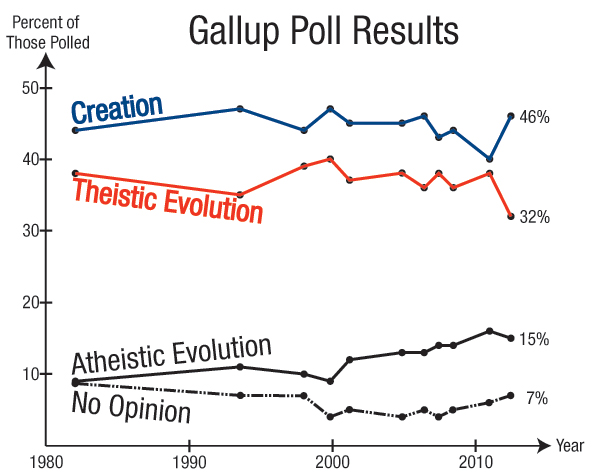Below is the online edition of In the Beginning: Compelling Evidence for Creation and the Flood,
by Dr. Walt Brown. Copyright © Center for Scientific Creation. All rights reserved.
Click here to order the hardbound 8th edition (2008) and other materials.
1. Many organizations have surveyed public attitudes on the teaching of origins. Results are remarkably consistent, regardless of whether creationist, evolutionist, or another organization conducted the survey. Typically, responses are as follows:
5% I would like only evolution taught.
15% I would like only creation taught.
70% I would like both creation and evolution taught.
10% No opinion, or teach neither.
Some incorrectly claim that almost all scientists believe in evolution. The only survey of scientists of which I am aware involved chemists. Fewer than half (48.3%) said that “it was possible that humans evolved in a continuous chain of development from simple elements in a primordial soup.” A slight majority (51.7%) said that “supernatural intervention played a role.” [Murray Saffran, “Why Scientists Shouldn’t Cast Stones,” The Scientist, 5 September 1988, p. 11.]

Figure 251: Gallup Polls. Eleven Gallup polls have surveyed beliefs in the United States concerning origins. People were given four choices:
(1) Creation: God created man in his present form at one time within the last 10,000 years.
(2) Theistic Evolution: Man has developed over millions of years from less-advanced forms of life, but God guided this process, including man’s creation.
(3) Atheistic Evolution: Man has developed over millions of years from less-advanced forms of life. No God participated in this process.
(4) No Opinion
Notice how few people are atheistic evolutionists, yet this position dominates the media and most schools. Surprisingly, despite a century of monopolistic and required teaching of evolution, so many are creationists. Both common sense and scientific evidence reject evolution.
Sampling errors: ±3 %. Data taken from George Gallup Jr., The Gallup Poll (Wilmington, Delaware: Scholarly Resources Inc.).